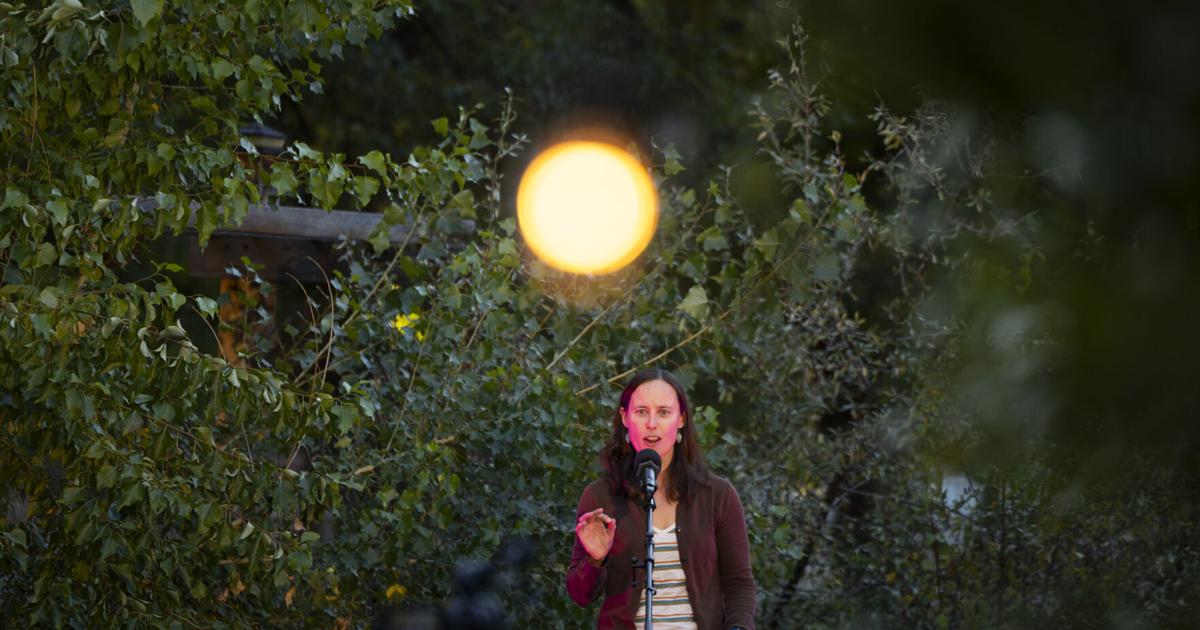
Zoe Belinda with the University of Montana’s Office of Sustainability held a small gong, which she would softly hit if speakers at the office’s first “Sustainability Slam” event Wednesday night went over their allotted two minute speaking time.
Nearly 20 speakers took to the stage set up in the Davidson Honors College Patio to speak on what sustainability means to them in poems, explainers and personal stories — from ways to “slay” sustainability through thrifting to the benefits of hemp.
Office Director Eva Rocke said she wanted the night to be an opportunity for community for people who work in the sustainability world. Rocke said outside of achieving sustainability goals, “human relationships are the main reason to do any of this.”
The City of Missoula’s stormwater program specialist Marie Nelson gave a talk titled “8,000 Mouths to the River,” about the more than 8,000 storm drains throughout the Garden City. She described them as “8,000 chances to either pollute or protect for water.”
Residents can now “adopt a drain” through a new city initiative, she said.
“You pick a drain on the map, you clear it, care for it, keep an eye on it, give it a name — yes, you get to name it — but keep it clean,” she said. “Literally, though, we need you to keep it clean.”
Associate Professor of Outdoor Recreation and Wildland Management Will Rice talked about “Teddy Tahoe,” and the effectiveness of Lake Tahoe’s anti-littering mascot “Teddy” — a cartoon character of Lake Tahoe with sunglasses and a bandana.
Rice said even though Lake Tahoe has a reputation for pristine, clear waters it has the third highest concentration of microplastics of lakes globally with available data.
“Teddy Tahoe” was the most effective signage Rice created as part of an initiative to get people to stop littering in the area, in collaboration with a colleague at the University of Kansas.
It was effective because it was memorable with its alliteration and because of its personification, it “activates moral norms,” where people think about consequences and accept responsibility, Rice said.
“Teddy is Lake Tahoe — so any litter affects Lake affects Teddy directly,” Rice said. “With tools like Teddy, we get people to do the right thing and hopefully reduce the amount of microplastic accumulating in Lake Tahoe.”
Sam Forstag said he’s spent the better part of the last decade working wildfires in Missoula or advocating and organizing in Helena for different causes from conservation to homeless services and he’s noticed some similarities in these fields of work.
“You might work 16 plus hours a day, cutting and digging fire line, and you’ll spend more mornings than you’d like waking to find slops and spots where the fires found its way across or a line in the night,” Forstag said.
Organizing across Montana and advocacy at Montana’s capital in Helena during the legislative session can have a similar feeling, he said.
“You’ll have more warnings than you’d like, where you find the same thing — new fires in every county or committee that you’ve got to go chase down as quick as you can,” he said.
“But when you’ve fought enough fire, you learn that there’s a poetry to these things too,” he said.
Even when it’s been hot and dry for weeks, the rains or snow always come eventually, Forstag said, and when fighting for sustainability for the future, there’s overlap with other causes.
“There’s a rhyme and a rhythm to the way people take back power when things have gone too far — like a forest regrows after a wildfire — backup will arrive, the rains will come, and together, we might just get this thing hooked,” Forstag said. “That’s sustainability, that’s solidarity.”
Julia Galloway, who makes pottery decorated with endangered species, decided to start donating a portion of her proceeds to the land trust next to the silica mine in Chicago where some of her clay is sourced.
“The people on this land trust think this crazy woman in Montana is sending them these very bizarre little amounts of money,” Galloway said. “They seem delighted.”
The event was sponsored by Clearwater Credit Union, whose Clean Energy Program Coordinator Jeremy Flesch read a poem about the work of sustainability being difficult but worth it.
The credit union provides loans for homeowners looking to make their houses more energy efficient through solar panels or other means like insulation.
Cool Earth Creamery provided free vegan gelato and campus dining provided food.
Attendee Simona Stan teaches sustainable business practices as a Professor of Marketing said she liked the format of the event, the personal stories shared and the diversity of voices present.
“It’s great to be reminded that sustainability means so many things to so many people,” she said. “Because it’s so easy to get depressed.”
“Often, students ask me, ‘What can we do?’” she said. “They should be here, to listen to this.”
Nicole Girten is the education reporter for the Ravalli Republic and the Missoulian.
You must be logged in to react.
Click any reaction to login.
Love
0
Funny
0
Wow
0
Sad
0
Angry
0
Want to see more like this?
Get our local education coverage delivered directly to your inbox.
* I understand and agree that registration on or use of this site constitutes agreement to its user agreement and privacy policy.
Nicole Girten
Education reporter for the Ravalli Republic & Missoulian
Get email notifications on {{subject}} daily!
Your notification has been saved.
There was a problem saving your notification.
{{description}}
Email notifications are only sent once a day, and only if there are new matching items.
Followed notifications
Please log in to use this feature
Log In
Don’t have an account? Sign Up Today